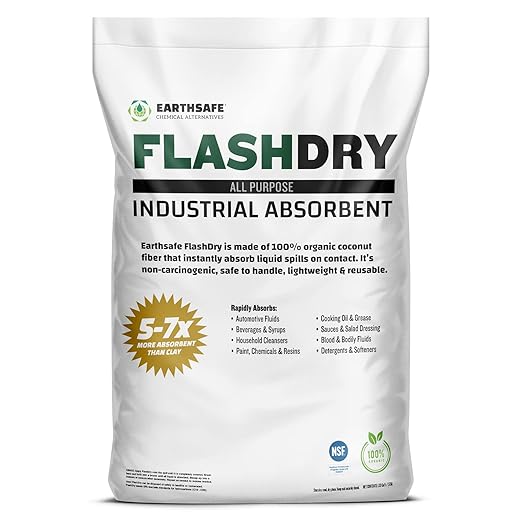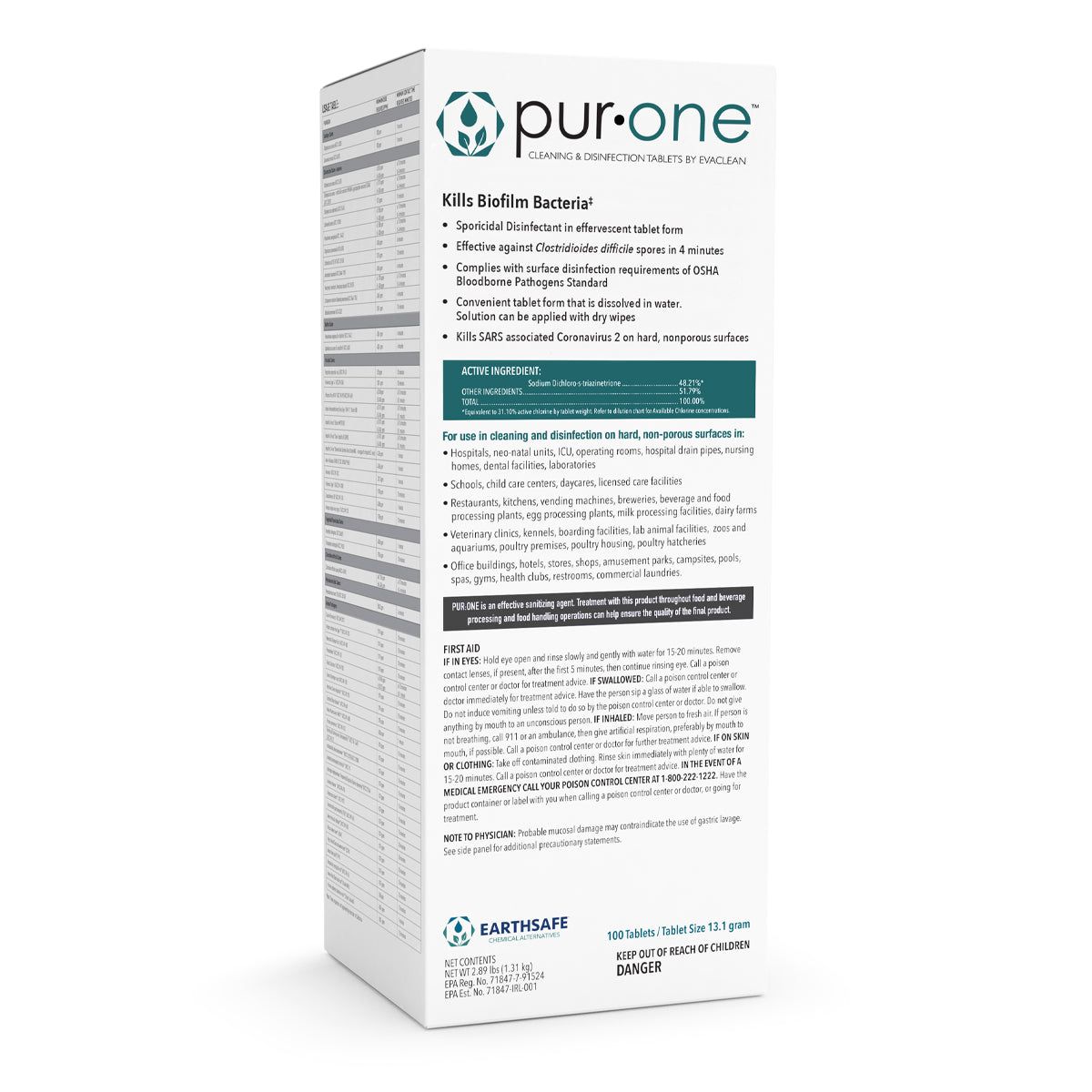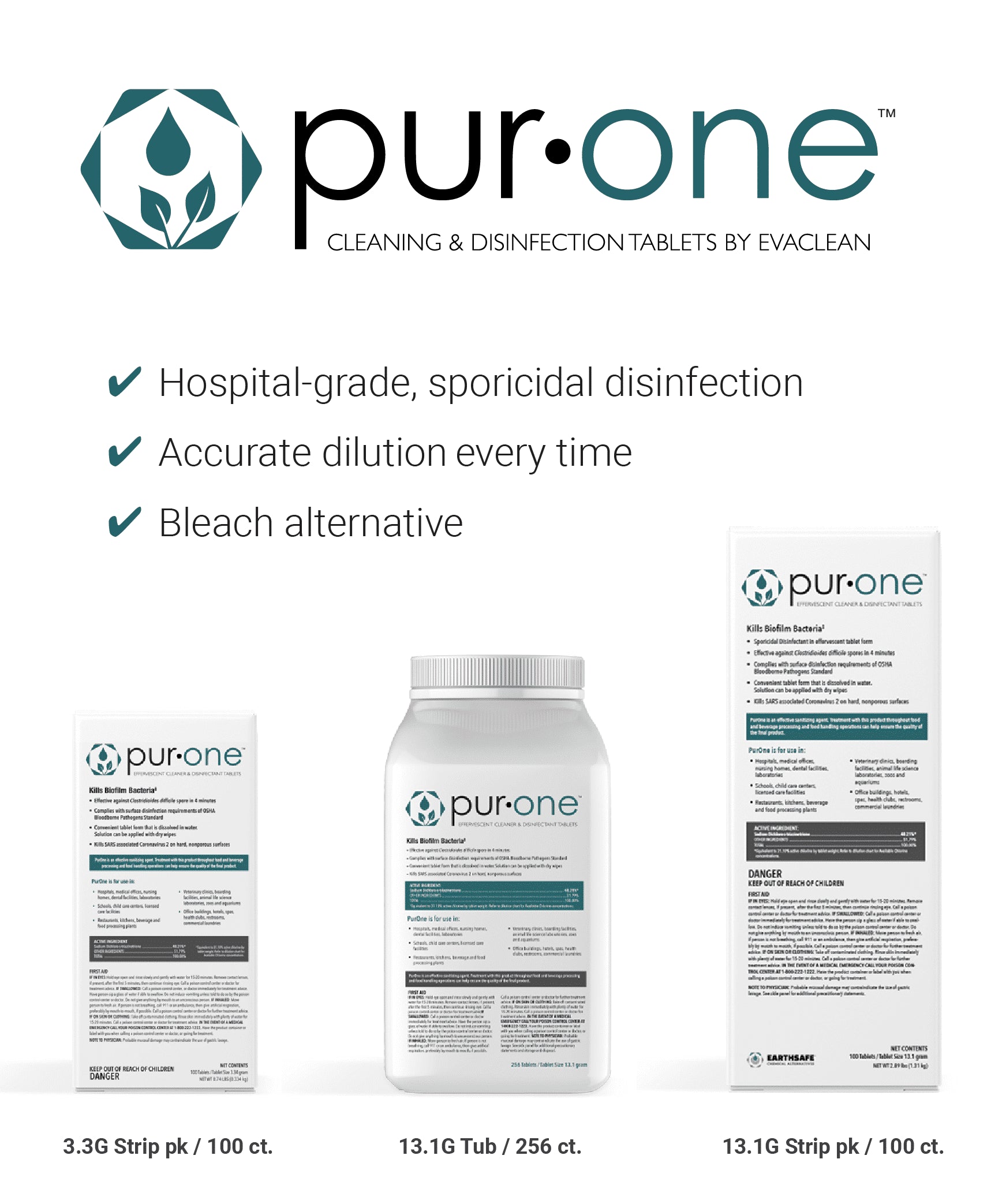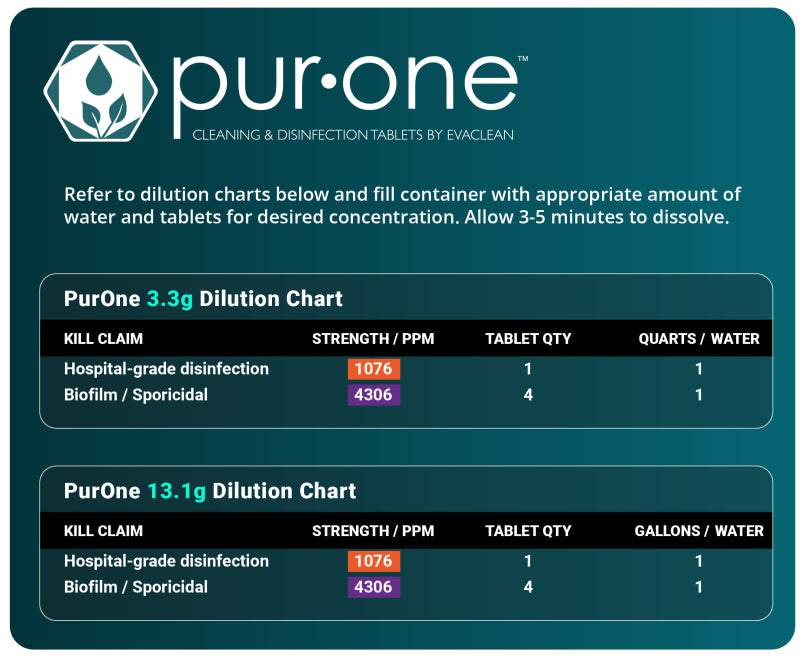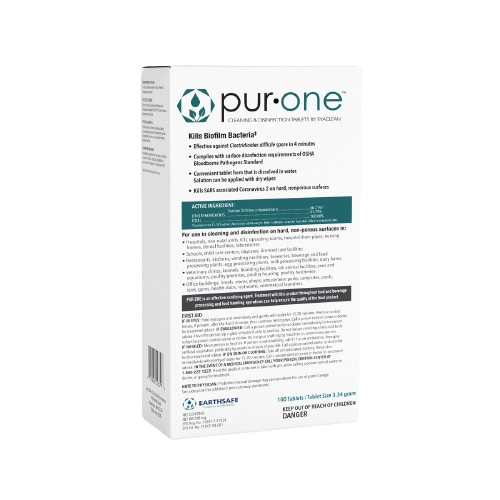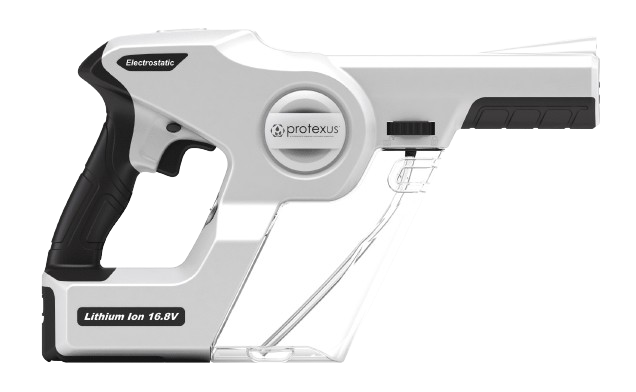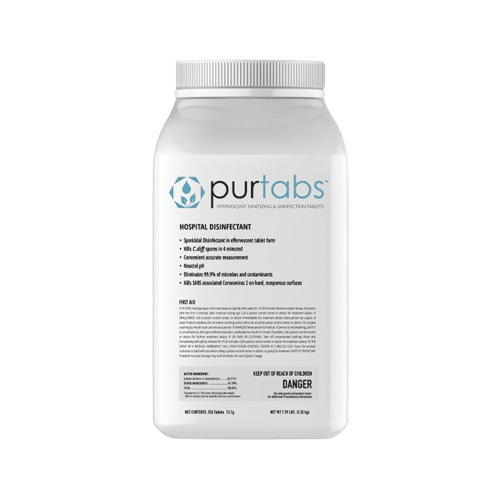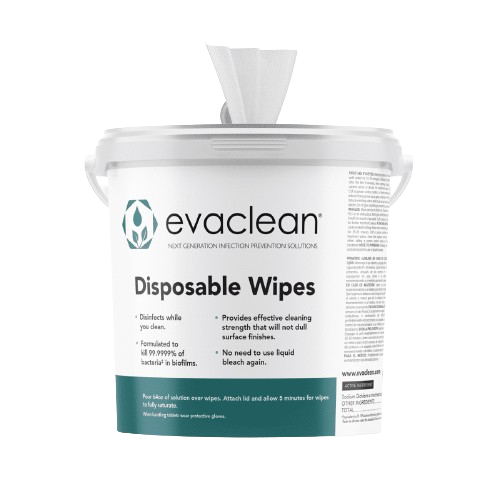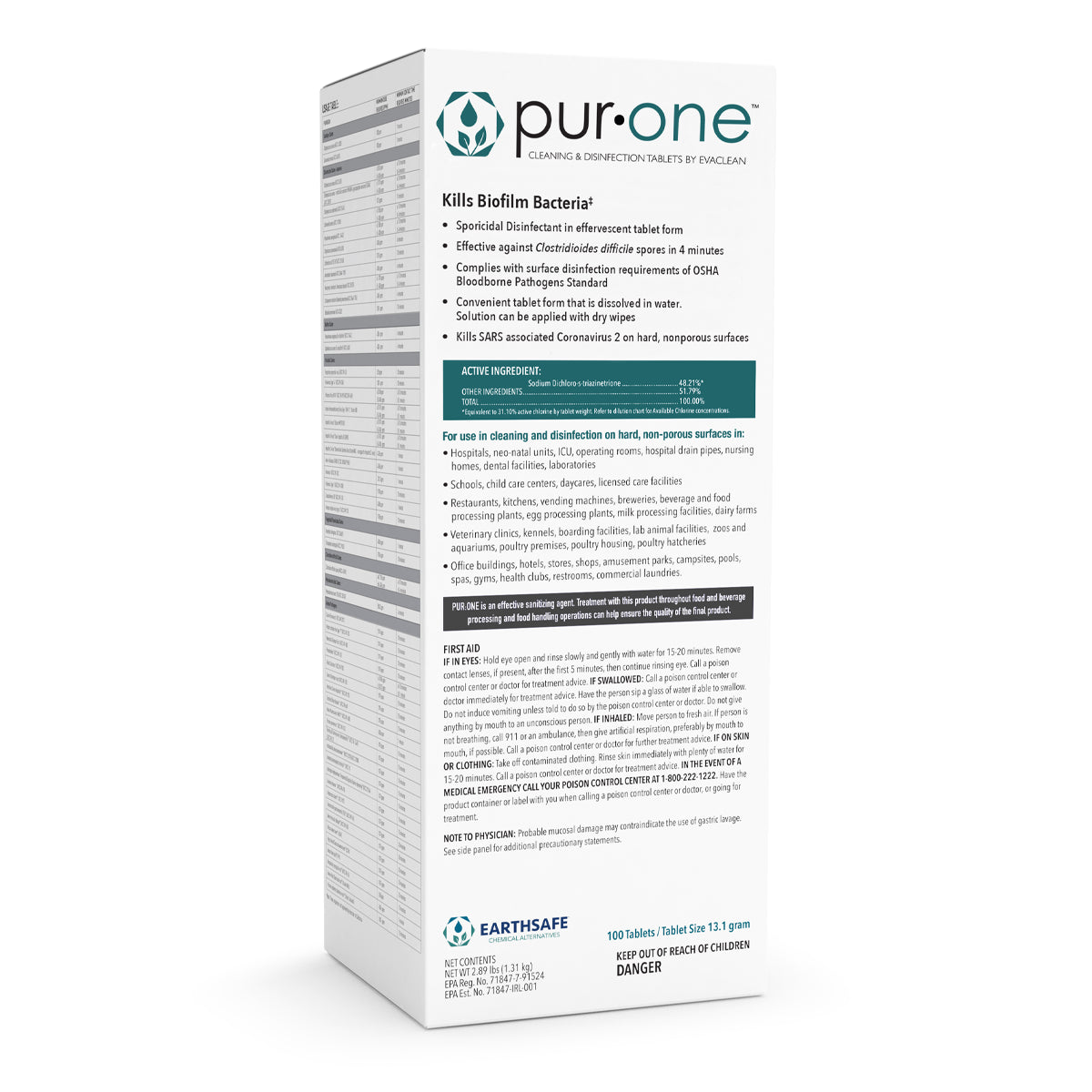
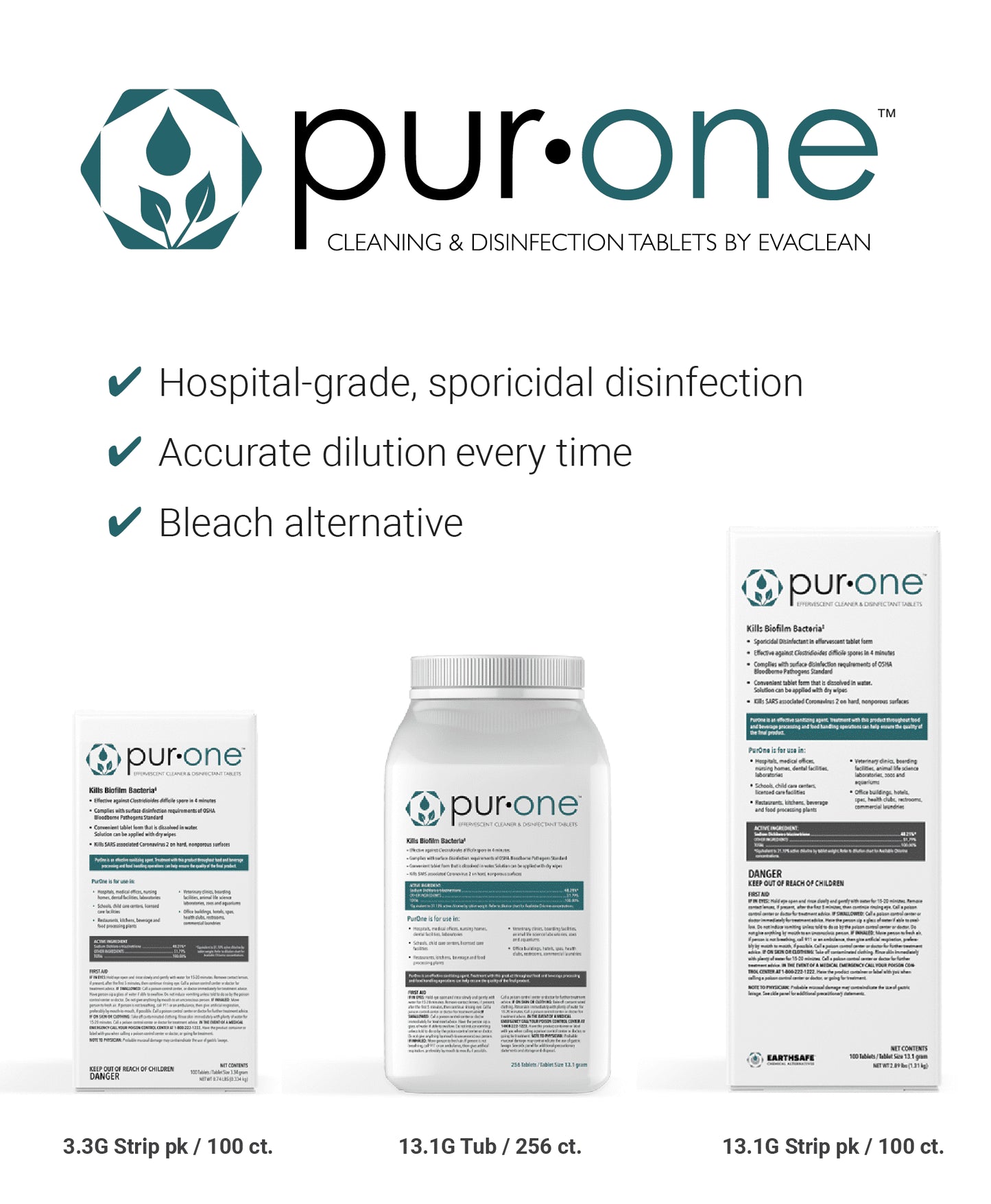
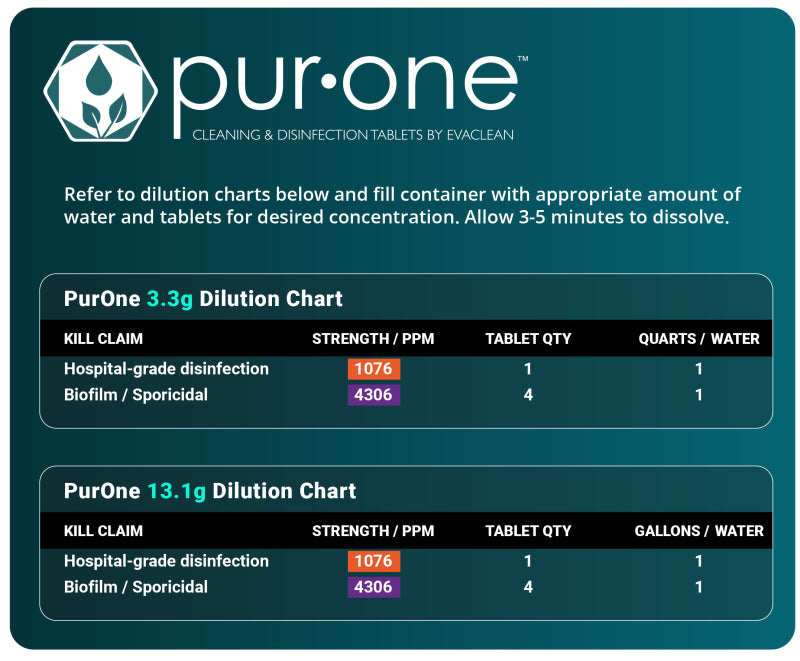
Clean, disinfect and kill biofilm bacteria with one tablet.
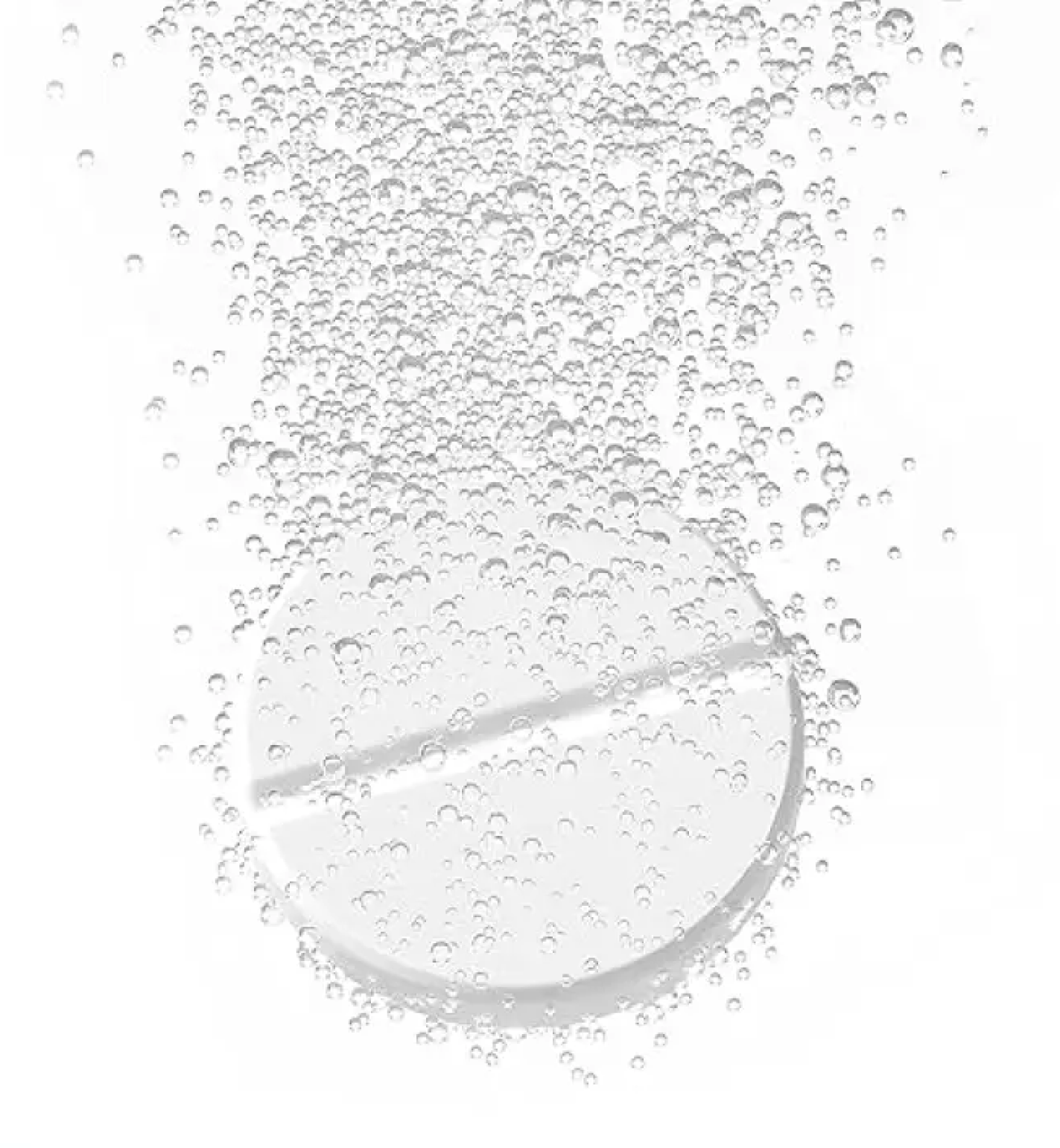
Tablet Technology
PurOne tablets are safer to use, dispose of, and more versatile and effective than bleach. NaDCC retains chlorine longer than bleach and exerts a more prolonged bactericidal effect without the burning, corrosive toxicity of bleach. It's even safe on many fabrics, and the minimal chlorine scent dissipates quickly after application leaving a clean, refreshed scent.
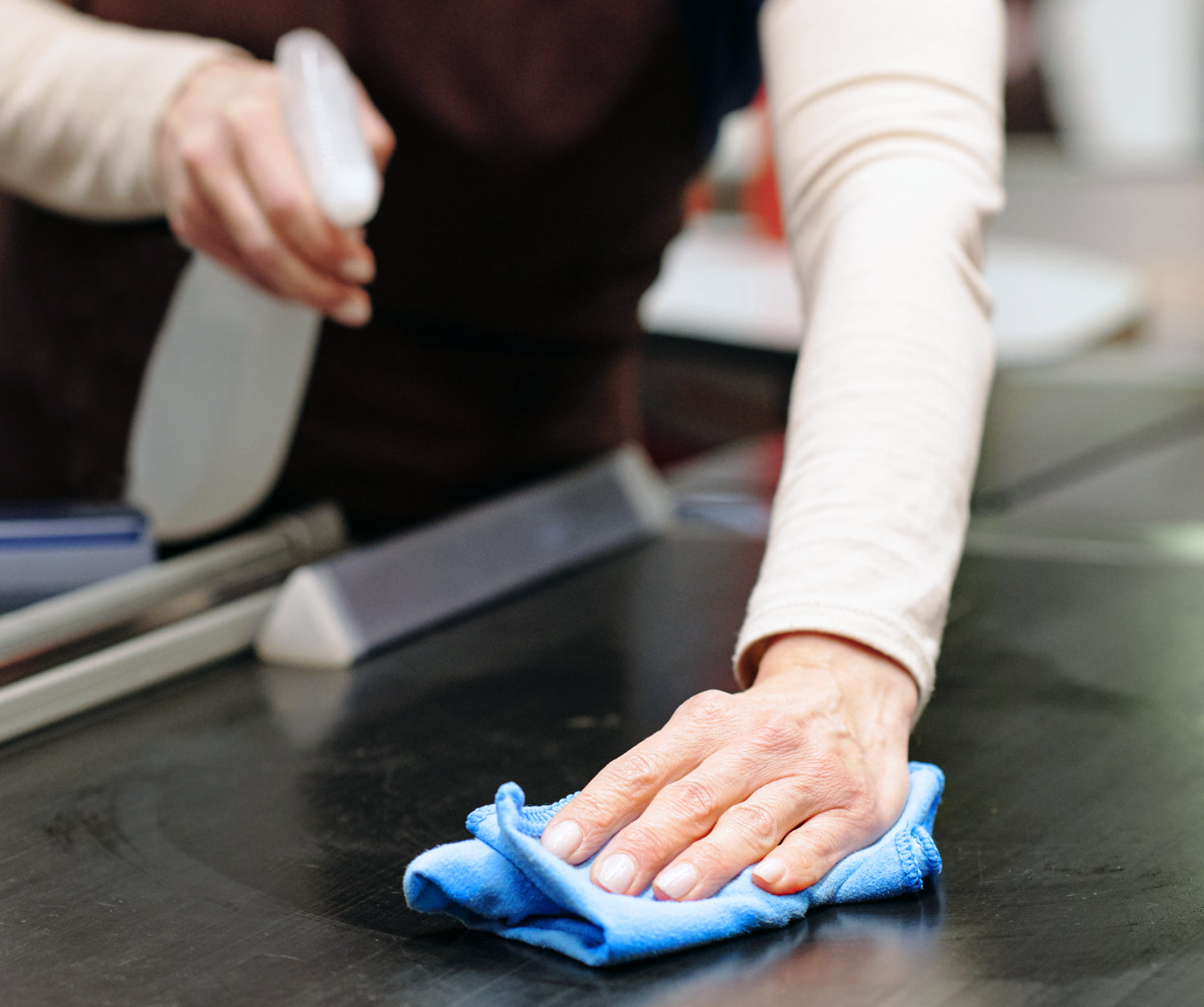
Advanced Versatility
PurOne is the front end of the EvaClean Program good reason: It can replace up to ten different chemistries, and can be paired with microfiber cloths, string mops, surface wipes, and more. Now you can customize, refine, and redefine what "clean" means.
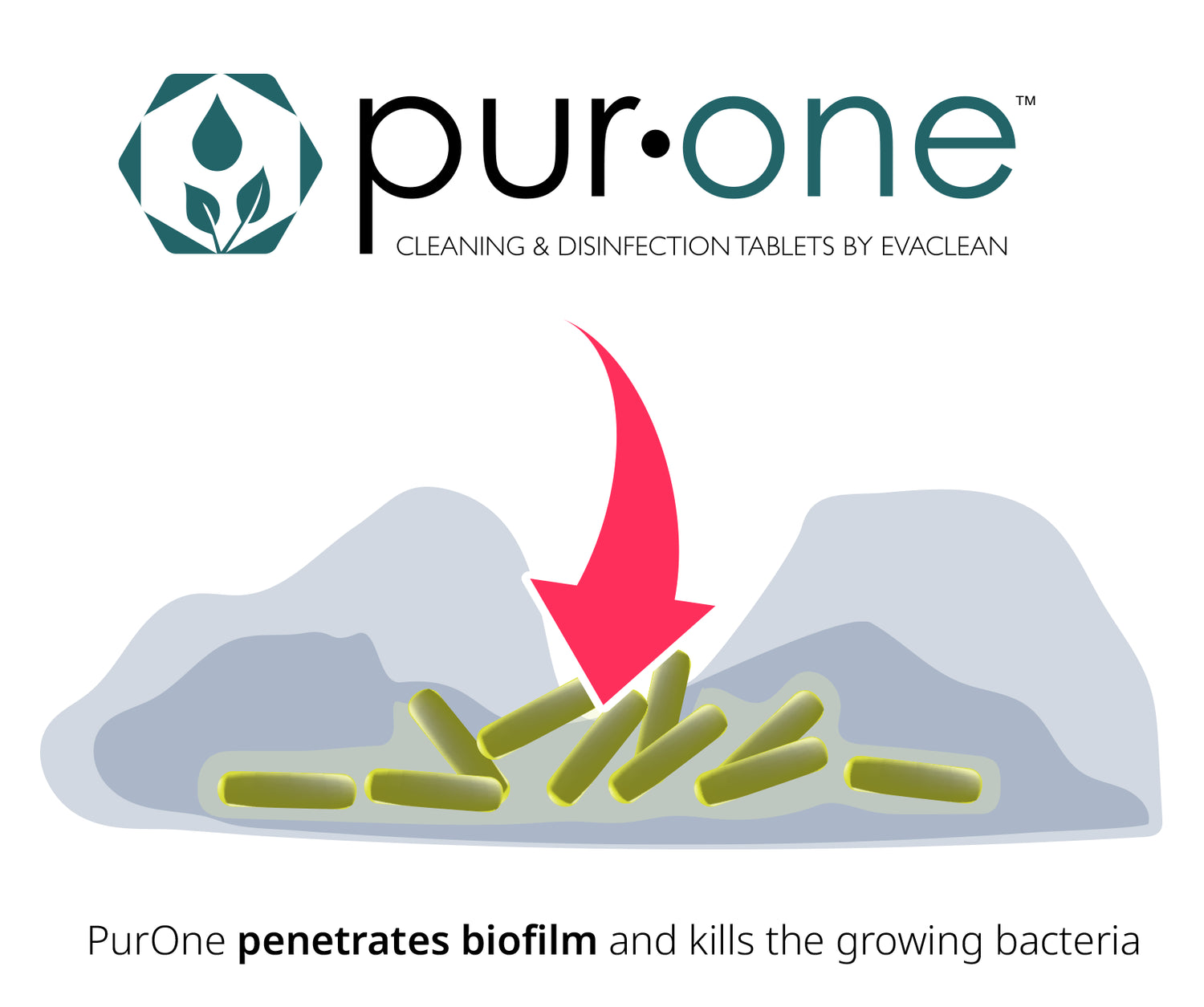
Biofilm Killer
If your disinfectant does not work on biofilm you are not disinfecting! Bacterial biofilms are groups of bacteria that colonize on surfaces and surround themselves with a protective coating, which is very difficult for standard cleaning products to remove. PurOne is the first disinfectant with an EPA-registered kill claim to effectively kill bacteria in biofilm in just 4 minutes. By incorporating PurOne into your cleaning routine, you can confidently tackle biofilm buildup and maintain a cleaner environment for everyone.
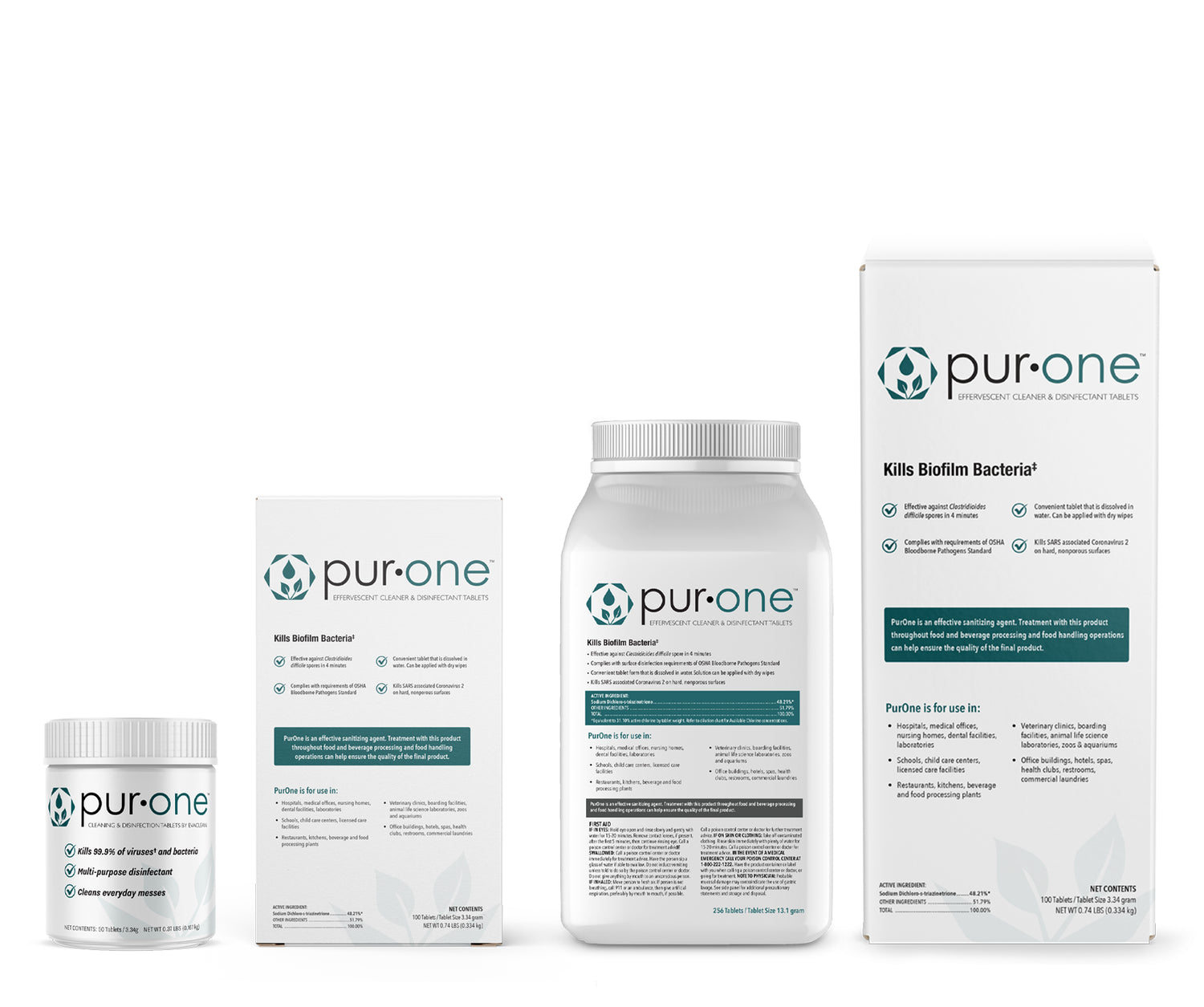
One Product, Multiple Uses
PurOne tablets quickly dissolve in everyday tap water to produce a hospital grade disinfectant solution that can replace bleach, peracetic acid, and quats in any disinfecting program. Plus, with its sporicidal efficacy, PurOne can be used to combat the toughest pathogens, from COVID-19 to C. diff.
PurOne Label Kill Claims
Click to Expand Kill Claims Table
| PATHOGEN | 538 PPM | 1076 PPM | 2153 PPM | 4306 PPM | 5382 PPM |
|---|---|---|---|---|---|
| SOFT NON-FOOD CONTACT SURFACES SANITIZER CLAIMS (NATURAL OR COTTON FABRICS) | |||||
| Klebsiella aerogenes | 2 mins | ||||
| Staphylococcus aureus | 2 mins | ||||
| DISINFECTION CLAIMS - BACTERIA | |||||
| Staphylococcus aureus (ATCC 6538) | 4 mins | 2 mins | |||
| Staphylococcus aureus – (MRSA) & (GRSA) (ATCC 33592) | 4 mins | 2 mins | |||
| Staphylococcus epidermidis (ATCC 51624) | 4 mins | ||||
| Salmonella enterica (ATCC 10708) | 4 mins | 2 mins | |||
| Pseudomonas aeruginosa (ATCC 15442) | 4 mins | 2 mins | |||
| Streptococcus pneumoniae (ATCC 6305) | 4 mins | ||||
| Streptococcus uberis (ATCC 19436) | 4 mins | ||||
| Escherichia coli O157:H7 (ATCC 35150) | 4 mins | ||||
| Acinetobacter baumannii (ATCC BAA- 1709) | 4 mins | ||||
| Multi-drug resistant Acinetobacter baumannii (ATCC 19606) | 4 mins | 2 mins | |||
| Vancomycin resistant Enterococcus faecalis (ATCC 51575) | 4 mins | 2 mins | |||
| Carbapenem resistant Klebsiella pneumoniae (ATCC BAA-1705) | 2 mins | ||||
| BIOFILM CLAIMS | |||||
| Pseudomonas aeruginosa (in a biofilm) ‡ ATCC 15442 | 4 mins | ||||
| Staphylococcus aureus (in a biofilm) ‡ ATCC 6538 | 4 mins | ||||
| VIRUCIDAL CLAIMS | |||||
| SARS Associated Coronavirus (SARS-CoV- 2) Strain Isolate USA-WA1/2020 † | 4 mins | 1 min | |||
| Human Coronavirus strain 229E (ATCC VR- 740) † | 2 mins | 1 min | |||
| Respiratory syncytial virus † (ATCC VR-26) | 2 mins | ||||
| Rhinovirus Type 14 † (ATCC VR- 284) | 2 mins | ||||
| Influenza A Virus H1N1 † (ATCC VR-99) (ATCC VR-1469) | 1 min | ||||
| Influenza A Virus H3N2 † (ATCC VR-544) | 2 mins | ||||
| Human Immunodeficiency Virus Type 1 (HIV-1) † (Strain IIIB) | 2 mins | 1 min | |||
| Hepatitis A virus † (Strain HM175/18f) | 4 mins | 1 min | |||
| Hepatitis B virus † (Duck Hepatitis B virus (DHBV) | 2 mins | 1 min | |||
| Hepatitis C virus † (Bovine Viral Diarrhea Virus Strain NADL – surrogate for Hepatitis C virus) | 2 mins | 1 min | |||
| Avian influenza A virus (H5N1) † (CDC #2006719965) | 4 mins | 1 min | |||
| Norovirus † (ATCC VR-782) | 4 mins | 1 min | 1 min | ||
| Poliovirus Type 1 † (ATCC VR-1000) | 4 mins | ||||
| Coxsackievirus B3 † (ATCC VR-30) | 4 mins | 1 min | |||
| Herpes simplex virus type 1 † (ATCC VR- 733) | 2 mins | ||||
| FUNGICIDAL CLAIMS | |||||
| Aspergillus fumigatus (ATCC 36607) | 1 min | ||||
| Candida albicans (ATCC 10231) | 1 min | ||||
| Candida auris (CDC AR-0381) | 2 mins | ||||
| Trichophyton interdigitale (ATCC 9533) | 4 mins | 2 mins | |||
| CLOSTRIDIOIDES DIFFICILE CLAIMS | |||||
| Clostridioides difficile spores (ATCC 43598) | 10 mins | 4 mins | |||
| MYCOBACTERICIDAL CLAIMS | |||||
| Mycobacterium bovis (TB) (ATCC 35743) | 4 mins | ||||
| ANIMAL PATHOGENS | |||||
| Canine Parvovirus † (ATCC VR-2017) | 4 mins | ||||
| Herpes simplex virus type 12 † (ATCC VR- 733) | 2 mins | ||||
| Newcastle Disease Virus † (ATCC VR-108) | 4 mins | ||||
| Pseudorabies virus † (ATCC VR-135) | 4 mins | ||||
| Feline Calicivirus † (ATCC VR-782) | 4 mins | ||||
| Canine Distemper virus † (ATCC VR-128) | 4 mins | 1 min | |||
| Infectious Canine hepatitis2 † (ATCC VR 293) | 10 mins | ||||
| Minute Virus of Mouse (MVM) † (ATCC VR-1346) | 4 mins | ||||
| Teschen/Talfan disease2 † (ATCC VR-669) | 10 mins | ||||
| Influenza A Virus H1N1 † (ATCC VR-99) | 10 mins | 1 min | |||
| Influenza A Virus H3N2 † (ATCC VR-544) | 2 mins | ||||
| Avian influenza A virus H5N12 † (ATCC VR-1608) | 4 mins | 1 min | |||
| Porcine parvovirus 2 † (ATCC VR-742) | 4 mins | ||||
| Runting & Stunting virus (tenosynovitis)2 Avian reovirus† (ATCC VR-2449) ( ATCC VR-21) | 4 mins | ||||
| Actinobacillus pleuropneumoniae2 † (NCTC 12370) (ATCC 27088) | 10 mins | ||||
| Bordetella bronchiseptica (rhinitis)2 † (ATCC 19) | 4 mins | ||||
| Brachyspira hyodysenteriae (Treponema/Serpulina) (swine dysentery)2 † (ATCC 27164) | 10 mins | ||||
| Gumboro disease2 † (ATCC VR-478) | 10 mins | ||||
| Streptococcus uberis (ATCC 19436) | 4 mins | ||||
| Transmissible gastroenteritis (TGE)2 † (ATCC VR-743) | 4 mins | ||||
| Swine Vesicular disease2 † (ATCC-VR- 158) | 30 mins | ||||
| African swine fever2 † (ASFV) | 30 mins | ||||
| Hog cholera/Classical swine fever2 † (CSFV) | 30 mins | ||||
| Avipox (fowl pox)2 † (FPV) | 30 mins | ||||
| Respiratory syncytial virus2 † (ATCC VR- 26) | 2 mins | ||||
| Bovine Viral Diarrhea Virus2 † (Strain NADL) | 1 min | ||||
| Duck Hepatitis B Virus2 † (Duck Hepatitis B virus (DHBV)) | 1 min | ||||
| Porcine epidemic diarrhea virus2 † (Strain Colorado) | 4 mins | ||||
| Porcine respiratory and reproductive syndrome (PRRS) virus (Strain NVSL) | 4 mins |
FAQs
How does PurOne compare to bleach?
PurOne offers an alternative to bleach. Unlike bleach, PurOne efficiently retains chlorine for longer durations and does not lose potency upon contact with organic matter, ensuring a prolonged bactericidal effect.
Why is it important for a disinfectant to be effective against biofilm?
The CDC (Centers for Disease Control) estimates that over 65% of nosocomial (healthcare-acquired) infections are caused by biofilm, and studies have shown that bacteria in biofilm are 10 to 100 folds more resistant to disinfectants. PurOne penetrates biofilm, and kills the bacteria inside.
How do EvaClean products influence regular cleaning schedules?
EvaClean products significantly simplify and expedite cleaning routines. By eradicating the dependence on harsh chemicals and cumbersome products, they pave the way for a more efficient, safer, and effective cleaning approach.
Buy from the Manufacturer
Order from us and cut costs
Nationwide US Shipping
We ship right to your door
100% secure Checkout
Encrypted payments
Find the right EvaClean product
-
PurOne
Learn moreKill biofilm bacteria with the drop of a tablet. Use PurOne sporicidal with your current cleaning equipment to tackle C. diff, and more.
-
Protexus Electrostatic Sprayer
Learn moreDisinfect full rooms in just a few minutes. Our sprayer is light, easy to use, and can disinfect or sanitize up to 3x greater surface area than traditional programs.
-
PurTabs
Learn moreEliminate “measure and pour” guesswork. PurTabs dissolve into ordinary tap water, giving you the solution strength your facility requires.
-
Surface Wipes
Learn morePair wipes with our PurOne tablets to make cleaning and disinfecting high-contact surfaces quick and efficient.
